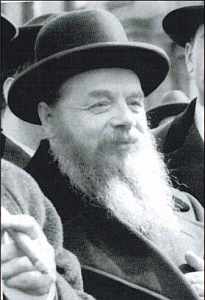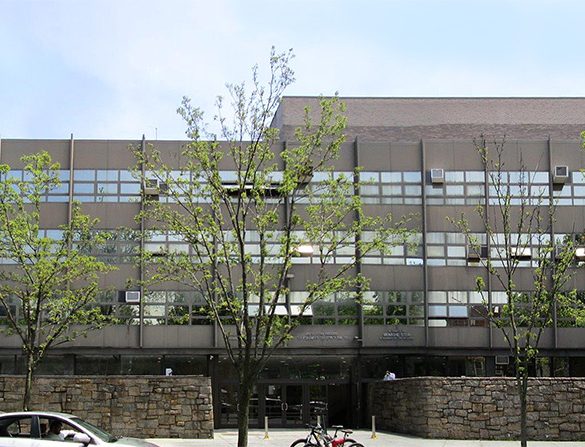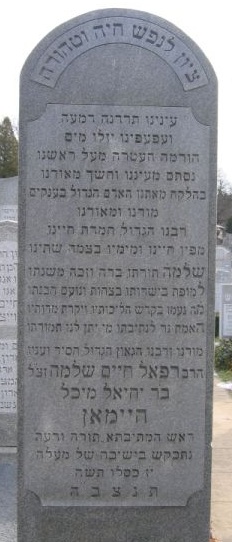HaRav Heiman zt"l

The yahrtzeit of HaRav Raphael Chaim Shlomo Heiman, gaon and true Torah pioneer in America, is 17 Kislev. He was niftar in 1945 at the age of 52, so this is his 76th yahrtzeit. We first published this 26 years ago, in the year of the 50th yahrtzeit, in our print edition in Eretz Yisroel. This is a major addition of information on HaRav Heiman to the Internet. It was written by Rabbi Zilberman originally in English specifically for the Israeli English Yated Ne'eman.
Part III
HaRav Simchah Shustal tells the following story that he heard from the Rebbetzin about the tzidkus of R' Shlomo and how he fortified himself so as not to stumble into sin:
R' Shlomo lived off the meager salary he received from Torah Vodaas. He never requested more for himself, being careful how he used yeshiva money.
One year the Heimans decided to travel to Seagate to rest up in the summer. Before their trip they sat down to check their budget carefully and see how they could manage. They wrote down the exact amount needed for transportation, food, rent, and various other expenses. R' Shlomo then asked his wife whether she had finished the list. When she replied yes, he told her, "Add another $25 for sholom."
Feige, totally surprised, said that she was not aware that her nephew Shalom was planning to come with them. R' Shlomo then explained that he had not meant her nephew, rather he meant sholom — peace. Renting bungalows together with other people, sharing certain facilities and sometimes cooking together, frequently brings about tension and differences of opinion. He wanted to set aside $25 in the budget so that he would know that if he suffered a loss because of another person it would already be part of his budget — and then he would not take it to heart. If he had no loss than he would view the money as profit.
Another story HaRav Shustal heard from the Rebbetzin shows how the Rosh Yeshiva fulfilled "And I will make the heart of a widow joyous" (Iyov 29:13):
Due to problems with the army, young R' Shlomo had to study in Radin for about a year and a half. There he became acquainted with HaRav Boruch Yosef Feivelson, the son-in-law of R' Naftoli Trop. R' Boruch was an exceptional talmid chochom and delivered shiurim in Radin after R' Naftoli's death in 5690/1930. Unfortunately, R' Boruch died at the age of thirty-seven and left a young widow. Although very much attached to the Chofetz Chaim, whenever R' Shlomo visited Radin after he was married he would pay his respects to the widow of R' Boruch Feivelson even before visiting the godol hador, the Chofetz Chaim.
During the summer of 5703/1943 the Rosh Yeshiva and HaRav Moshe Aharon Stern stayed in the Beis Medrash Elyon of Monsey. R' Moshe Aharon's room overlooked a garden with a path encircling it -- the view was breathtaking. Once he saw R' Shlomo strolling along the path, when suddenly a gigantic bulldog, which was apparently annoyed by his red-whitish beard, jumped on him. R' Moshe Aharon was so startled that he froze. Luckily the cook heard what was going on and took up an iron spit to chase the dog away, thus saving R' Shlomo. The Rosh Yeshiva later said that it could be that this happened to him since, when he was walking around the garden, its beauty attracted him so much that he stopped thinking about divrei Torah. This was a clear violation of "One who walks along the road while he is learning and then stops his learning to say: `How beautiful is that tree!' `How beautiful is that plowed field!', the posuk regards him as if bearing guilt for [the loss of] his own life" (Avos 3:7). "If I had not stopped my studies," he said, "then certainly nothing could have happened to me."
Torav Vodaas today

Relationship With Rav Shraga Feivel Mendelowitz
R' Shraga Feivel Mendelowitz received smicha from the Hungarian gedolei Torah HaRav Shmuel Unsdorfer and from the Arugas HaBosem, at the young age of seventeen. After coming to America and seeing what American rabbis were like, he said the first mitzvah he did in America was to burn his certificates of smicha. Later Rav Mendelowitz personally established Yeshivas Torah Vodaas in Williamsburg, the Beis Medrash Elyon in Monsey, and the vast network of Torah Umesorah throughout the U.S.A. He actually laid the foundation for the entire Torah education movement and the development of the yeshivos in America. HaRav Moshe Feinstein defined R' Shraga as: "The father of all bnei Torah in America in this generation and in the coming generations."
When HaRav Aharon Kotler met Rav Shraga Mendelowitz for the first time he addressed him as "Rav Mendelowitz." Rav Shraga instantly retorted that he is "Mister" Mendelowitz and not Rav Mendelowitz. R' Aharon answered back: "You are not a `mister,' you are a `nister.' "
Despite R' Shlomo and R' Shraga having come from two distinctly different backgrounds — R' Shlomo from a strictly Lithuanian atmosphere while R' Shraga came from a Hungarian Chassidic atmosphere — they got along famously. Since Torah Vodaas prayed nusach Sephard and kept all the customs of the Chassidim, R' Shlomo, the Litvak, also put on a gartel.
The Nitra rosh yeshiva of Mt. Kisco, HaRav Michael Ber Weissmandel zt'l, depicted the relationship between the two as follows: "If the rav is like an angel of Hashem you should seek Torah from him" (Mo'ed Koton 17a). Has anyone ever seen an angel to know if his own rav is similar? The explanation is that if the rav acts in the way we are told the angels do, namely, "And they lovingly give permission one to the other" (Tefillas Shacharis — Nusach Sephard) then you should seek Torah from him. Such was the relationship between R' Shraga Feivel and R' Shlomo Heiman. (Shelucha DeRachmono p. 156-157).
One day while R' Shraga Feivel was in the middle of saying a shiur, R' Shlomo's brother-in-law suddenly appeared to tell him that R' Shlomo had been found to have a malignant growth. R' Shraga was so terribly upset at the tragic news that he was forced to tell his students that he could not continue, and left the room. When R' Shlomo returned to say shiurim after weeks of oncological treatment, the students noticed R' Shraga was also crowding in among them to hear R' Shlomo's shiur. They saw how overjoyed he was by the very fact that R' Shlomo could still say shiurim (Shelucha DeRachmono p. 161).
Feige — The Devoted Wife
The Heimans lived like two doves. He was always a devoted husband while she was a self-sacrificing wife. She was always dedicated to his cares and needs, constantly trying to lighten his pain. Since she was always heartbroken about their being childless, he used to comfort her and say: "Feigeleh, Feigeleh, why are you so sorrowful? All the talmidim are your children!"
She actually felt that the talmidim were her children and did all she could for their sake. She used to even bake delicious chocolate cakes for the Torah Vodaas students. Even after R' Shlomo's death the talmidim continued to visit her.
The results of the medical test that R' Shlomo had taken after he became sick again with cancer were due to be ready ten minutes before sunset on erev Shabbos. The Rebbetzin told him to pick up the results and then go to the yeshiva. Meanwhile she would light the Shabbos candles and they would meet midway to the yeshiva. The results were not good. R' Shlomo had to break the news to her, but he softened it in the best way to pacify her emotions somewhat. He told her: "Feigeleh, when Heaven calls a person when he is old, do you think he wants to go then? They are only calling me a bit sooner."
In his last years he was forbidden to eat foods containing sugar and salt, ingredients that add taste to food. R' Shlomo said to his wife: "Feigeleh, do you really think that you can make anything that has no taste?"
"Even during his last days, when his pains were unbearable, Rebbe was constantly worried about others. He felt the alarm that his critical condition caused among those near to him, and especially in his beloved, self-sacrificing wife. He used to call her over to his bedside and beg her to take care of herself. `Feigel,' he would say, `you suffer so much because of me; my moaning causes you such sorrow!'" (Orthodox Tribune).
"After R' Shlomo's death the Rebbetzin wrote a letter to one of his talmidim describing how lonesome she felt after the crown was removed from her head . . .. She concluded by writing that we must understand that the ways of Heaven are righteous and just, and that we are unable to grasp and understand them. Man must, however, be fully aware that if HaKodosh Boruch Hu requested that we conduct the world ourselves, our answer would be, "Ribono shel olam, only You are the ruler Who can conduct the world, not us. Conduct it according to Your will" ("Introduction to Chidushei R' Shlomo").
Sickness And Death
When his doctor informed him that his condition was fatal, he undertook to refrain from saying drush and occupy himself only with disseminating Torah learning. He explained his move by saying that in drush we are not accustomed to weigh so carefully each and every word that we write and say to make sure that they are entirely true. In order to convey an idea, matters are sometimes compared without enough analysis of whether they are truly identical.
This was, of course, characteristic of R' Shlomo's incessant search for truth which he now wished to perfect. He later found that the Pnei Yehoshua writes in the beginning of his introduction that, after he was saved when his house collapsed upon him during a fire, he decided that his main study would be sugyos of Shas and poskim and not drush or other studies that are far from the nucleus of true knowledge. He was extremely pleased to see this confirmation of his decision.
When the Rosh Yeshiva was groaning in his insufferable pain, HaRav Dan Ungarisher was in a nearby room. He heard R' Shlomo complaining to himself and saying: "Ribono shel olam, if only I had groaned in this way when I did not understand a Tosafos, then I would not have to groan now."
The tombstone. Credit: Brent Stephens

A year before his death R' Shlomo was operated on in an attempt to arrest his cancer. "A few moments before the operation, an attending nurse came in to Rebbe to soothe him. She remarked that the surgeon was one of the greatest in the world, and therefore he had nothing to worry about. Whereupon Rebbe shuddered and said that his trust was only in Ribono shel olom, the surgeon being merely a tool in the hands of the Almighty. His bitochon and faith in the Almighty were so real, so deep-rooted, that in this most critical moment he shuddered at the thought that he might place his trust in the skill of a surgeon. His trust was only in Hashem" (Orthodox Tribune).
After the long illness was at last over, the body of the Rosh Yeshiva was placed in the auditorium of Yeshivas Torah Vodaas. It was not brought to the beis medrash since there was an overflowing crowd. HaRav Moshe Feinstein, the godol hador, stood up and eulogized R' Shlomo Heiman. He said that "in knowledge of the scope of Torah learning there are people greater than R' Shlomo, but in deep analysis of a gemora or a rishon, R' Shlomo was unique in this generation."
On his death bed, R' Shlomo said to his talmidim that two important guests had arrived; they should prepare seats to honor the gaon R' Akiva Eiger zt'l and the gaon R' Chaim Ozer zt'l, who had come to visit him. These gedolei olam were his spiritual guides during his life: R' Akiva Eiger through his seforim showed him the profound truth of Torah understanding, and he spent uncountable hours speaking in Torah learning with R' Chaim Ozer and served many years as rosh yeshiva in his yeshiva. HaRav Shlomo Heiman zt'l was the fulfillment of the gemora's statement (Bava Metzia 62b) "When I (Rovo) die, R' Oshaiah will come to greet me, since I would answer the mishnayos as he learned the beraisos" ("Introduction to Chidushei R' Shlomo").
Author's Note: I would like to thank the many eminent rabbonim who gave of their precious time to portray R' Shlomo Heiman's life and greatness. Likewise, I express my gratitude to Rav Moshe Kolodny, the director of the Jewish Archives of Agudas Yisroel in America, who kindly sent us material and offered other aid for this article.




